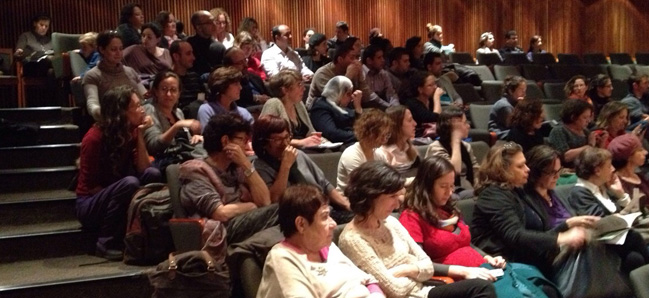
The violence and incitement of the summer spurred many individuals and organizations in Israel to intensify their work to combat racism and to promote a shared society. Two SHATIL-produced events this month showed the progress being made:
Shared and Safe Public Spaces: Activists gathered in Haifa in early December to discuss how political leaders, the media, and grassroots organizations can help create a public space in Israel that feels safe for Arabs and Jews alike even in times of conflict. Speakers included Talia Sasson, incoming president of the New Israel Fund; MK Afu Aghbaria (Hadash); and Eileen Lavery, head of strategic enforcement at the Equality Commission for Northern Ireland.
The atmosphere was charged as participants recounted the attacks on anti-war demonstrations last summer and the recent arson that occurred at Jerusalem’s Hand in Hand bilingual school. Aida Touma-Sliman, director Women against Violence, said it was essential for Jews and Arabs to condemn racists. “We do not hear the voice of civil society in real time,” she said.
Israel Radio correspondent Eran Zinger said the role of the media is to increase awareness about the complexity of the situation, which helps to break down stereotypes. Eitan Lederer, a representative for the Ministry of Justice, spoke about an initiative to lower the standard of evidence required to indict someone for incitement to racism.
The conference is a part of SHATIL’s shared society program and was produced with the support of the Heinrich Boell Foundation, the Fohs Foundation and the New Israel Fund, and in partnership with many grantees, including Sikkuy, the Coalition against Racism, Itach/Ma’ki, and others.
A Discourse with the Other: On December 14th, SHATIL held the conference “A discourse with the other” focusing on intercultural education in Jerusalem.
The conference was held in partnership with the Jerusalem Education Authority and in cooperation with the Jerusalem Foundation, Teacher’s Union, Midreshet Adam, Center for Youth Activism, the Jerusalem Intercultural Center, and other organizations. More than 100 people attended the conference, many of them teachers, education officials and administrators, and local officials. Attendees came from both the Western and Eastern parts of Jerusalem.
The conference began with participants presenting their innovative work to conference attendees. SHATIL Executive Director Ronit Heyd, Jerusalem Deputy Mayor Rachel Azaria, and Udi Spiegel from the Jerusalem Foundation gave the opening addresses.
Participants divided into discussion groups relating to coping with issues of education, politics, and racism in the classroom. The conference concluded with an address by the co-directors of Jerusalem’s bilingual school.
The conference was the result of months of work with the Jerusalem Education Authority and other organizations; SHATIL intends to continue its work in Jerusalem, and will assess its significance in light of broader efforts focusing on racism and shared society in the education system on the national level.
